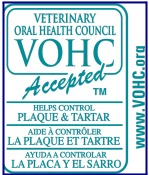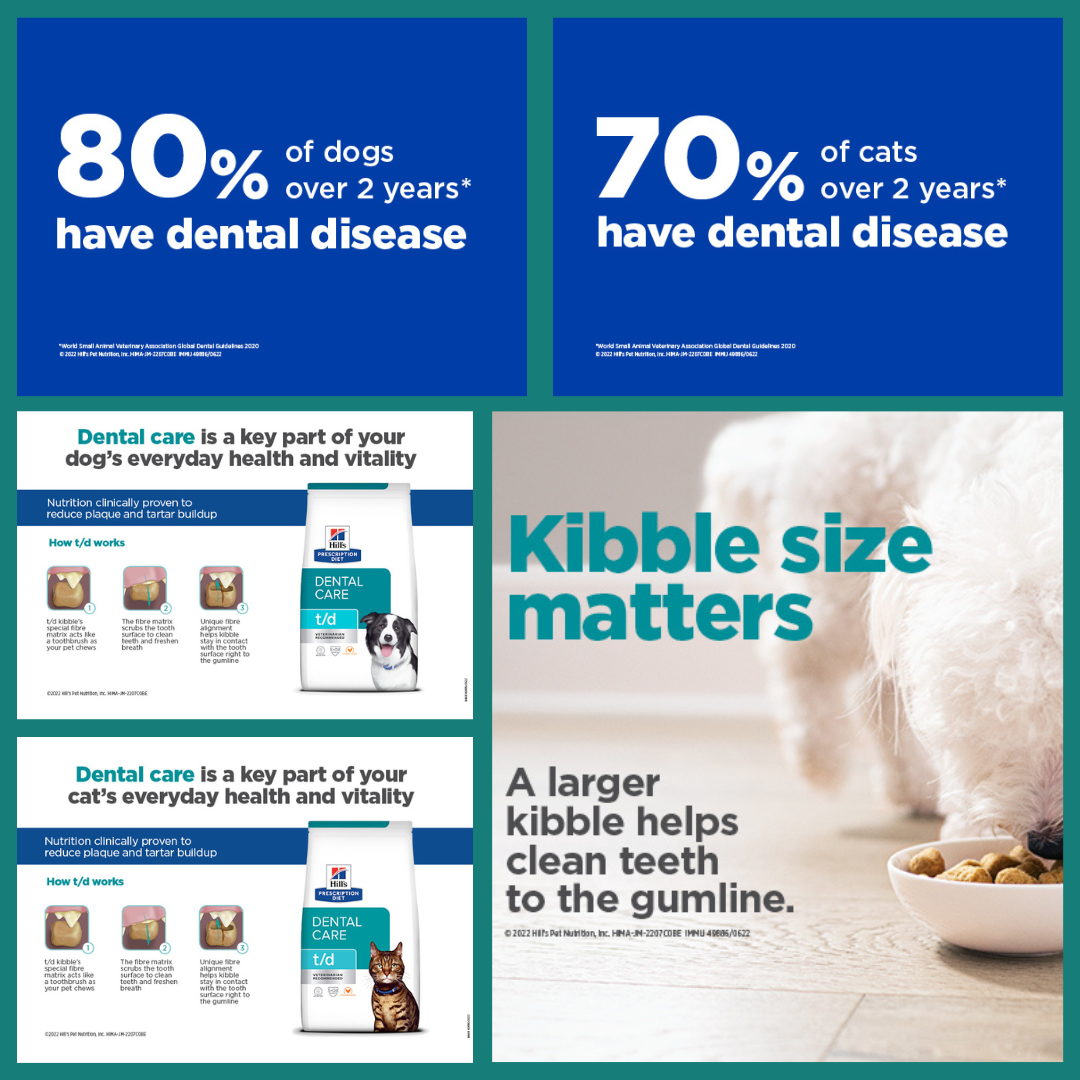We all know how important dental health is for our own teeth. We go to the dentist regularly and brush and floss our teeth twice a day. But did you know that dental health is important for your pet as well? Dental disease is the most common health problem of our pets – 70% of cats and 80% of dogs will have some level of disease by two years of age¹.
What causes dental disease in dogs and cats?
The underlying cause of dental disease is plaque. Plaque is that furry film you feel on your teeth when you first wake up in the morning. It is a mix of saliva, bacteria and tiny food particles that sticks to your teeth and accumulates especially at the gum line. If it is not removed, it can mix with minerals in saliva to cause tartar and the bacteria can cause pain and inflammation of the gums also known as gingivitis. This inflammation can eventually affect the tissues that support the teeth leading to tooth loss. It isn’t always obvious that your pet has dental disease but some signs you may see include bad breath, drooling, swollen gums and loss of interest in chew toys.
So how do I keep my dog or cat’s teeth clean?
Just as it is in ourselves, dental care is a two-step process that involves both professional and at home care. Your vet is your pet’s dentist – regular assessment and teeth cleaning by your veterinarian are important steps in caring for your pet’s teeth. Because gums are very sensitive and dogs and cats won’t sit in a chair with their mouths wide open, dental work in pets needs a general anaesthetic. This means the vet can properly check the entire mouth for any problems, and allows them to thoroughly clean your pet’s teeth, including under the gum line. However, again like us, dental care doesn’t stop there. Pets need a daily home dental care regime to keep their teeth clean in between visits to the vet. One option is to brush their teeth every day, however, our pets are not always cooperative and pet owners often find brushing difficult. That’s why feeding specialised dental foods can be a good alternative, as they can help clean your pet’s teeth whilst they eat.
There are so many dental diets and treats available, how do I know which one to choose?
The key to controlling dental disease is to control plaque, and this is something that not all dental diets and treats do. One thing to look for is the VOHC seal on the pack. This shows that the product has clinical studies which have been examined by a group of independent veterinary experts and that the product has been proven to help control either plaque, tartar or both. Only Hill’s dental foods (Hill’s Prescription Diet t/d and Science Diet Oral Care) have been awarded the VOHC seal for the control of plaque and tartar for both dogs and cats. 
How do Hill’s Dental Diets Work?
Most dry kibble shatters and crumbles in the mouth when the tooth comes into contact with the food. This is why ordinary dry kibble has minimal effect on the dental health of our pets. Hill’s dental foods have an innovative kibble designed to work like a toothbrush as pets eat. This diagram shows how they work. The unique combination of kibble size, shape and interlocking fibre technology allows the tooth to penetrate deeply into the kibble before it breaks. The kibble gently scrubs the tooth surface to clean teeth as the pet eats.
What is the difference between Hill’s Science Diet Oral Care and Hill’s Prescription Diet t/d?
Kibble size and density are both very important for the Hill’s dental foods. While all Hill’s dental foods have a large kibble size, t/d kibbles are the biggest. The large kibble size cleans the teeth to the gum line to promote healthy gums and teeth. Hill’s Prescription Diet t/d also has a lower density which prevents the kibble from breaking easily, increasing the time that the kibble is in contact with the tooth surface, improving its tooth cleaning ability. It is these differences in size and density between the t/d and Oral Care kibbles that make a difference in the level of reduction of plaque, tartar and stain. Science Diet Oral Care is for healthy pets to improve dental health. Prescription Diet t/d is for pets with signs of dental disease and should be used on the recommendation of your veterinarian.
Can I feed Hill’s Dental Diets long-term?
Hill’s Prescription Diet t/d and Science Diet Oral Care are both complete and balanced for adult dogs and cats. In addition to the dental benefits, they are complete and balanced to support your cat’s daily health, and our clinically proven antioxidant blend to support a healthy immune system.
In summary, if you have a dog or cat over 2 years of age, then the chances are that they may have some degree of dental disease. Treat their teeth as you would your own. Book in to see your veterinarian for a dental check-up and feed your pet Hill’s Science Diet Oral Care, or Hill’s Prescription Diet t/d if recommended by your vet, so you know that they are cleaning their teeth every day as they eat.
References:
1. Niemiec B, Gawor J, Nemec A et al. World Small Animal Veterinary Association Global Dental Guidelines
JSAP 2020;61:E50

